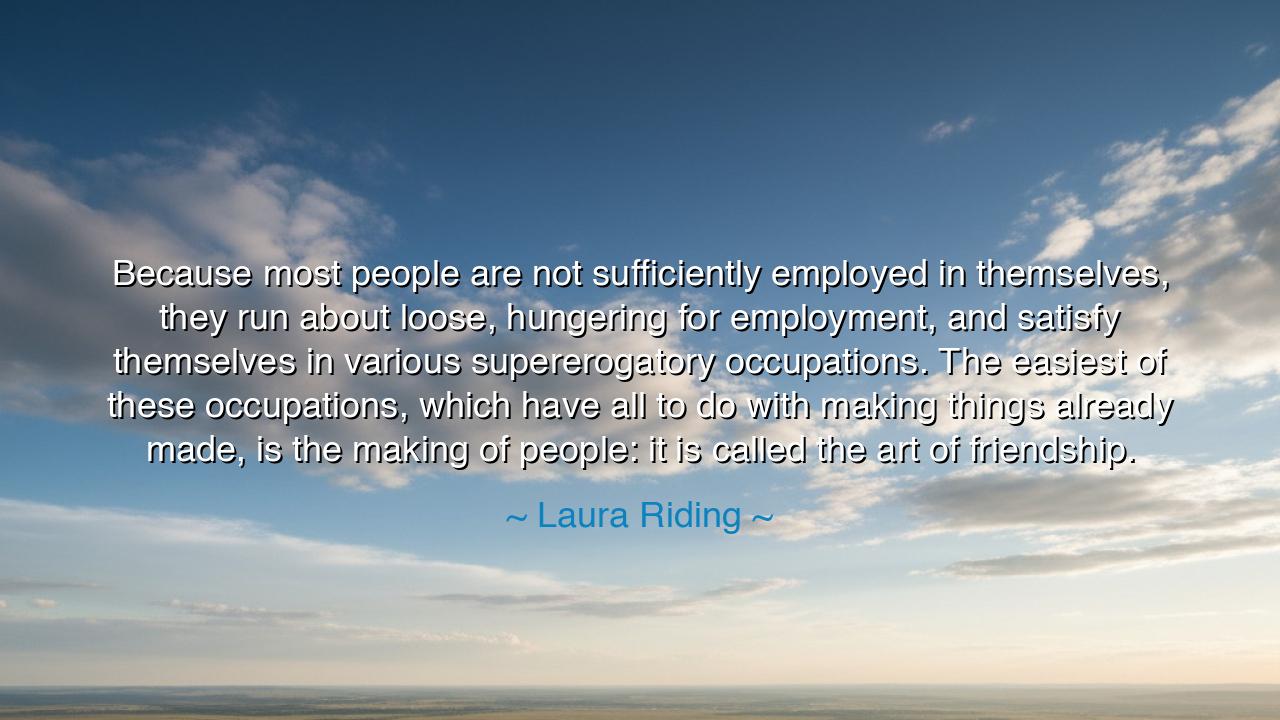
Because most people are not sufficiently employed in themselves
Because most people are not sufficiently employed in themselves, they run about loose, hungering for employment, and satisfy themselves in various supererogatory occupations. The easiest of these occupations, which have all to do with making things already made, is the making of people: it is called the art of friendship.






“Because most people are not sufficiently employed in themselves, they run about loose, hungering for employment, and satisfy themselves in various supererogatory occupations. The easiest of these occupations, which have all to do with making things already made, is the making of people: it is called the art of friendship.” In this piercing observation, Laura Riding, the poet-philosopher of selfhood, unmasks a paradox at the heart of human life — that many seek friendship not out of abundance, but out of emptiness. Her words are not a condemnation of friendship itself, but a call to understand its truest nature. For to her, friendship is not an idle pastime of lonely souls but a sacred exchange between those already whole within themselves. The “art of friendship” becomes divine only when it is practiced by those who no longer need others to complete them, but who, in their fullness, wish to share what overflows.
At its core, this quote speaks to the modern tragedy of restlessness. “Most people,” Riding writes, “are not sufficiently employed in themselves.” They have not yet found purpose or peace within their own being. Therefore, they run about, chasing occupations, distractions, and attachments to fill the void. She calls these pursuits “supererogatory occupations” — unnecessary labors, efforts to mend a soul that only contemplation can heal. Among these, she says, the most tempting and deceptive is the “making of people”, the attempt to construct meaning through others — through friendship, influence, or affection — rather than through inner work. She warns that if we seek companionship as a substitute for self-knowledge, what we create is not friendship, but dependency masked as connection.
The origin of this insight lies in Riding’s own life — a life of radical independence and relentless pursuit of truth. Once a literary partner of Robert Graves, she rejected fame, relationships, and even poetry itself when she felt they no longer served truth’s purpose. Her vision of friendship arose from her deep belief in the self as a sacred responsibility. To her, friendship was not about possession or entertainment but about integrity — two complete beings standing beside one another, not leaning upon each other. The “art of friendship”, in Riding’s sense, is not the crafting of relationships but the art of being someone worthy of friendship, so that when bonds form, they are born of mutual strength, not shared weakness.
History, too, testifies to this truth. Consider the friendship between Marcus Aurelius and Fronto, the Roman orator. Marcus, though Emperor, was a philosopher first — deeply employed in himself. His friendship with Fronto was marked not by need but by noble exchange: letters filled with reflection, humor, and respect. Their bond endured because it was not a filling of emptiness, but a dialogue between minds already aflame. By contrast, we see how the friendships of the restless — those who cannot stand solitude — often decay into gossip, jealousy, or rivalry. For as Riding suggests, the one who does not know himself will try to remake others in his image, confusing control for care and dependence for love.
Riding’s words also echo an ancient teaching that runs through every philosophical tradition: the wise man befriends, the unwise clings. In the dialogues of Plato, Socrates often reminds his companions that friendship is not about mutual flattery or comfort but about the pursuit of truth together. Similarly, in the teachings of Confucius, one is told to “cultivate the self before seeking to harmonize with others.” In both East and West, the same wisdom emerges — that the art of friendship begins in solitude, in the patient tending of the inner life. To “employ oneself” means to know one’s own mind, to work one’s own soil, to make of one’s spirit a garden where companionship may later bloom.
The lesson Riding offers, then, is both caution and guidance: Do not seek others before you have found yourself. Friendship is not the remedy for loneliness; it is the reward of self-cultivation. When you meet others before knowing who you are, you risk creating false connections — fragile constructions of need, destined to crumble when the winds of change blow. But when you are employed within — when your thoughts, dreams, and labors nourish your own soul — then your friendship becomes a gift, not a demand. It is not a search for completion, but an act of generosity.
In practical life, this teaching urges us to practice stillness and self-reflection. Spend time alone without loneliness, learning the contours of your own mind. Ask yourself what you bring into friendship — not what you hope to take. Learn to listen, not to occupy silence but to honor it. When you meet others, see them not as extensions of yourself but as worlds unto themselves, complete and sovereign. In such friendships, there is no plundering or possession — only mutual respect and shared light.
For in the end, Laura Riding’s wisdom reminds us that friendship, like art, is not created to fill emptiness but to celebrate fullness. The one who is at peace within himself will find companionship everywhere — in a friend, in a song, in the quiet rhythm of life itself. Such a person does not “run about loose,” for they carry their center within. Their friendship, then, is not a search for meaning, but the radiant overflow of meaning already found. And thus, as the ancients might say: to master the art of friendship, one must first master the friendship of the soul.






AAdministratorAdministrator
Welcome, honored guests. Please leave a comment, we will respond soon